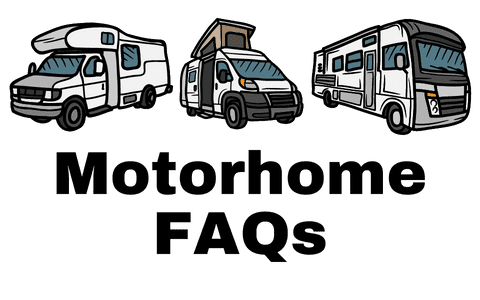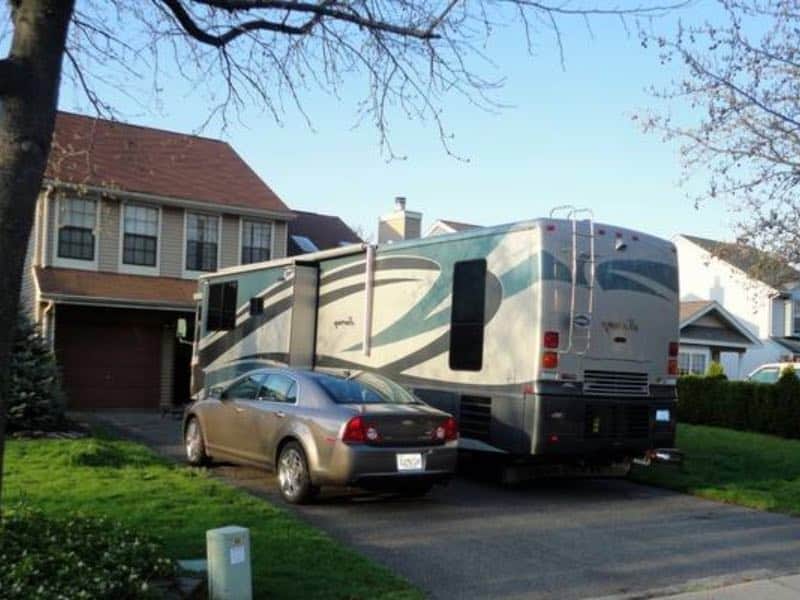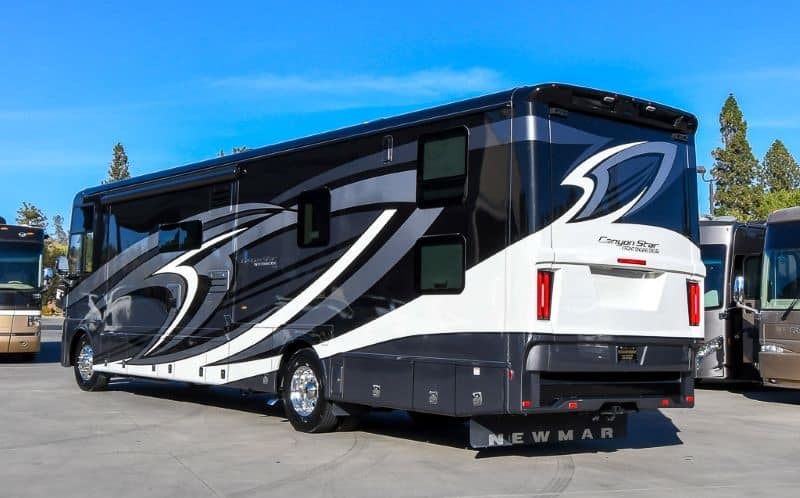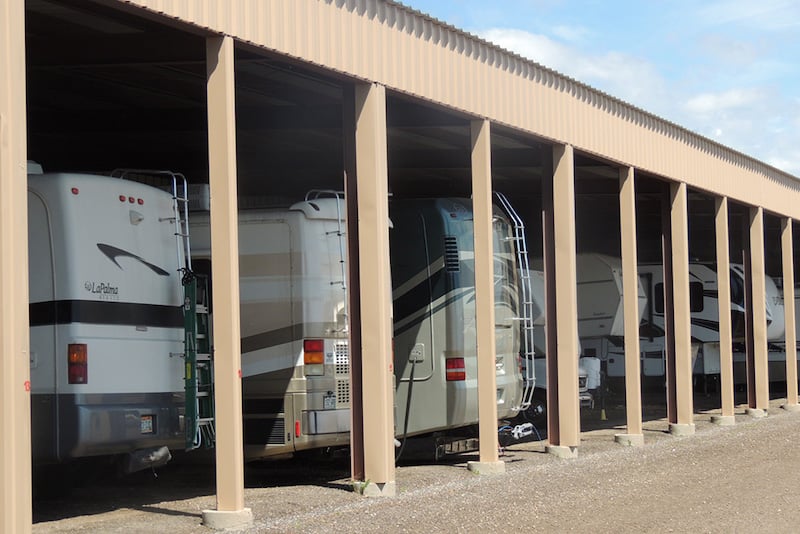Having the ability to park your motorhome in the driveway is undeniably appealing. We park our 24′ Class C RV in our driveway at home and the convenience it offers is hard to match.
Being able to pack up and hit the road straight from home saves you time and the financial burden of storage expenses.
However, not everyone can park their motorhome in their driveway. Many factors and considerations may prevent RV home parking from being workable for all owners.
In this blog post, we unpack these reasons and comprehensively answer the question: Can you really park your motorhome in your driveway?
Can You Park A Motorhome In Your Driveway?
Parking your motorhome in your driveway may seem simple, but it’s more complex than you might think. Most times, it’s possible, but there are some important considerations and restrictions.
The size of your vehicle is one such consideration. If you plan to park your RV in your driveway, the driveway should be at least long enough to accommodate your motorhome plus a few extra feet.
Properly parking your motorhome and following regulations to prevent blocking sidewalks or streets is crucial to avoid fines and penalties.
Rules and regulations vary depending on where you live and specific neighborhood guidelines. Many Homeowners Associations (HOAs) discourage the parking of RVs in driveways and yards.
And those that do allow RV parking may demand you hide the camper from the street view.
Local zoning regulations can also play a part. Some areas prohibit the permanent storage of motorhomes on driveways. In these cases, your RV may need to be registered and kept in road-worthy condition, even if it’s mostly parked.
Remember, a residential driveway is part of a neighborhood property, so whether you can park an RV there also depends on the rules set by your local government.
Can You Park Motorhomes On The Street?
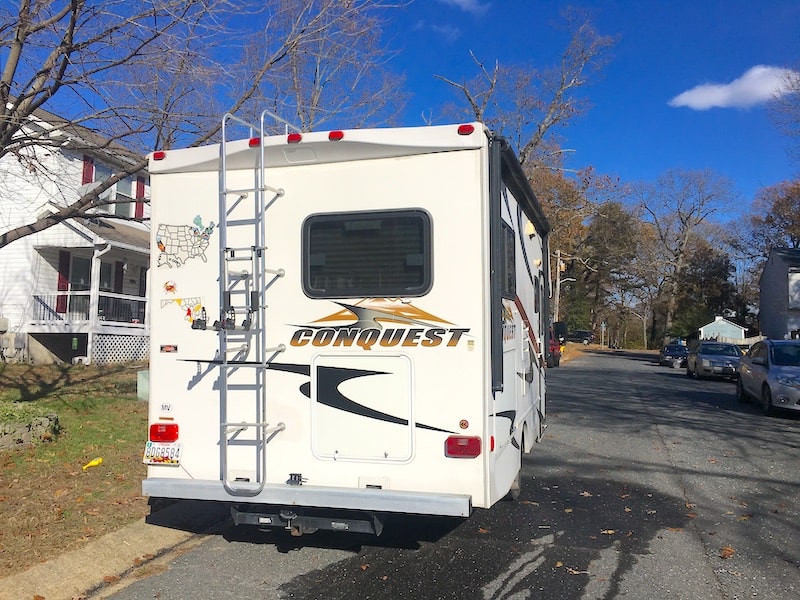
The picture above is our 24′ Class C Gulf Stream Conquest parked in the street in front of our house in Maryland.
You can park a motorhome on the street, but again the rules vary depending on location.
Some neighborhoods allow overnight parking of RVs on the road but not long-term parking. You can park a camper or RV on public streets without signs prohibiting it in many areas, but this is typically only allowed for short periods.
In some places, you can only park an RV on the street for up to 72 hours before residents can report it to local authorities.
However, there are some restrictions you must keep in mind. You cannot block anything with the RV, including driveways, mailboxes, and fire hydrants.
Also, because of the vehicle’s size, moving in the morning may not be accessible if other cars park around it.
Can You Store Your Motorhome In Your Backyard?
You can typically store your motorhome in your backyard, but the rules vary based on location. And your neighbors might not be happy if your RV is in view.
No federal law prohibits backyard RV parking, but local regulations might. Some neighborhoods or HOAs may have specific guidelines on RV parking.
They may limit the size of the vehicle, how long you can park it, or where you can store it. If you plan to install an RV gate for access from the street, you might need approval from your local planning department.
Always check the specific requirements in your area before starting any construction.
Storing your RV at home can save on storage costs and make it easier to access for repairs. You can also keep a closer eye on it for security.
Unfortunately, in many cases, it is not going to be an option for those without private rural property.
If You Park A Motorhome In Your Driveway Will It Damage The Driveway?
Yes, parking a motorhome in your driveway for a prolonged period could cause damage because of the vehicle’s weight.
Motorhomes are heavy, and the pressure exerted on a single point over time can lead to indents or cracks, especially in asphalt driveways.
To minimize the risk of damage, consider using pieces of wood to create larger footprints under the tires and stabilizers. These distribute the weight more evenly, reducing the pressure on any spot.
Be vigilant about leaks. Motorhomes can sometimes leak fluids such as oil or coolant, which can cause staining and degradation of the driveway surface.
Regular checks and prompt cleaning of any spills can help maintain the condition of your driveway.
5 Advantages Of Storing Your RV At Home
Storing your RV at home can provide several benefits:
1. Convenience
Having the RV at your disposal means you can pack, unpack, or prepare for a trip at your own pace without traveling to a storage facility.
For us it is also convenient to plug our Class C Rv in the night before a trip to cool the fridge and freezer overnight.
It also makes it easier to perform regular maintenance or cleaning.
2. Cost Savings
Storing your RV at home eliminates paying monthly fees at a storage facility, which can add up over time.
The local storage facility near us costs over $200 a month to store our RV!
If you don’t use your RV often, this could lead to substantial cost reductions.
3. Peace of Mind
Keeping your RV home allows you to monitor it closely.
You can ensure it is secure and well-maintained, reducing the risk of damage or theft that could occur at an off-site storage location.
4. Accessibility
Your RV is always within reach when you store it at home. You can take off on a fun trip anytime without making arrangements for storage, which is incredibly convenient.
And you also don’t have to worry about the storage facility’s hours or retrieving your vehicle from a distant location.
5. Flexibility
Storing your RV at home allows you to use it as an extra space when not in use for travel.
It can serve as a guest house, a quiet workspace, or even a playroom for kids. This flexibility makes an RV more than just a vehicle but an extension of your living space.
However, it’s essential to consider local regulations and space constraints before storing your RV at home.
Some neighborhoods or cities may have restrictions on parking oversized vehicles in residential areas.
5 Advantages Of Using An RV Storage Facility
Using an RV storage facility can also offer several benefits:
1. Space-saving
RVs are large vehicles that take up significant space.
Storing your RV at a facility frees up space at your home, which is especially beneficial if you have a smaller driveway or yard.
2. Enhanced Security
Storage facilities often have robust security measures, such as locking gates, surveillance cameras, and security personnel on-site.
Compared to storing at home, storage facility security offers an additional safeguard against theft or vandalism.
3. Prevents Property Damage
Parking a heavy RV at home for extended periods can cause damage to your driveway or yard, including indents or stains from leaks.
Using a storage facility eliminates this risk, helping to keep your property in good condition.
4. Maintenance Services
Some RV storage facilities offer maintenance services, such as cleaning, winterizing, and de-winterizing.
Convenient maintenance can be a significant advantage because it saves you time and effort and ensures your RV is well cared for even when you’re not using it.
5. Community
Many RV storage facilities have a community of other RV owners, which can be a great source of advice, tips, and camaraderie.
You might even make some new friends who share your love of RVing.
While these advantages are noteworthy, it’s also essential to consider the ongoing cost of using a storage facility and the convenience factor of traveling to access your RV.
Are RV Storage Facilities Safe?
Yes, RV storage facilities are safe.
Many facilities have security measures, like locking gates, surveillance cameras, and on-site security personnel, making them safer than storing your RV at home.
However, it’s important to note that rare thefts can still occur. Therefore, when choosing a facility, consider one with solid security measures. Sufficient lighting is crucial as it can improve video surveillance efficiency.
Besides the facility’s security, taking personal precautions can also increase safety.
For instance, if you’re storing your RV indoors, ensure the facility has proper ventilation systems to prevent moisture buildup, which can lead to damage.
While the facilities do their best to provide a secure environment, it’s crucial that you also play your part in ensuring the safety of your RV.
Always lock your vehicle, avoid leaving valuables inside, and check on your RV regularly.
It’s also worth calling your insurance agent to make sure your RV is insured while at a storage facility. Not all insurance will cover your RV while in storage, which we will discuss further in the next section of this article.
Do You Need Insurance On Your Motorhome When You’re Not Using It?
Whether you need insurance on your RV when it’s not in use can depend on various factors. In some regions, only liability coverage is required, but the specifics can vary from place to place.
If financing your RV, your lender typically requires you to maintain insurance, even if the vehicle is unused.
Towing RVs are often exempt from minimum liability limits in many areas because they’re covered under the towing vehicle’s insurance. However, it might be a wise choice to keep some level of coverage even during off-peak seasons.
You can opt for storage-only insurance, which covers your RV for incidents like theft, vandalism, and damage from falling objects when you’re not using it.
It’s also important to remember that without RV insurance, you could face legal and financial ramifications if you’re involved in an accident or caught driving uninsured.
So, while dropping insurance when your RV isn’t being used because of potential risks and legal requirements is a cost-saving measure, maintaining coverage is advised.
Certain storage facilities may also require it as part of their terms.
Final Thoughts About Parking A Motorhome In Your Driveway
Parking a motorhome in your driveway can be a convenient and cost-effective solution for storage.
It provides easy access for spontaneous trips, maintenance, and cleaning. And you have control over the security of your vehicle.
However, there are a few considerations to keep in mind.
First, check your local regulations and HOA rules, as some areas restrict parking large vehicles in residential areas.
Second, consider the space available. Your driveway should accommodate the size of your motorhome without obstructing sidewalks or roadways. You also need to ensure the ground is solid enough to support the weight of your motorhome.
And finally, think about the exposure to elements.
You expose a motorhome parked in a driveway to weather, which can lead to wear and tear. Invest in a good quality cover to protect it from sun, rain, and snow.
While parking a motorhome in your driveway can be practical, weighing the pros and cons and considering all relevant factors is essential.
– Essential Motorhome Spare Parts & Tools To Carry
– When to Turn on Your RV Tank Heaters
– Why Does My RV Furnace Blow Cold Air?
– How Often Do Motorhomes Break Down?
About the Author:

Mike Scarpignato is an avid RVer and outdoorsman. He travels with his wife Susan in their Class A 2021 Thor Challenger and their Class C 2008 Gulf Stream Conquest. Mike is also the owner of RVBlogger.com, TravelTrailerPro.com, and RV Camping Magazine.
